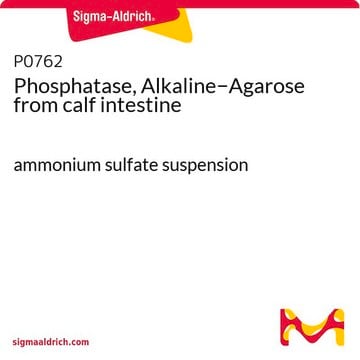P4069
Phosphatase, Alkaline from Escherichia coli
buffered aqueous glycerol solution, 20-50 units/mg protein (in glycine buffer)
Sinónimos:
Orthophosphoric-monoester phosphohydrolase (alkaline optimum)
About This Item
Productos recomendados
biological source
Escherichia coli
Quality Level
form
buffered aqueous glycerol solution
specific activity
20-50 units/mg protein (in glycine buffer)
foreign activity
DNase, RNase, none detected
storage temp.
−20°C
¿Está buscando productos similares? Visita Guía de comparación de productos
Application
- in fluorometric assay to determine its enzyme activity
- in the dephosphorylating enzyme cocktail for dephosphorylation of peptides
- in treating the nerve and HL60 cell lysate for β-hydroxy β-methylglutaryl-Coenzyme A (HMG-CoA) reductase activity
Biochem/physiol Actions
Caution
Unit Definition
Physical form
Analysis Note
Inhibitor
Related product
Substrate
signalword
Danger
hcodes
pcodes
Hazard Classifications
Resp. Sens. 1
Storage Class
10 - Combustible liquids
wgk_germany
WGK 1
flash_point_f
Not applicable
flash_point_c
Not applicable
ppe
Eyeshields, Gloves, type N95 (US)
Certificados de análisis (COA)
Busque Certificados de análisis (COA) introduciendo el número de lote del producto. Los números de lote se encuentran en la etiqueta del producto después de las palabras «Lot» o «Batch»
¿Ya tiene este producto?
Encuentre la documentación para los productos que ha comprado recientemente en la Biblioteca de documentos.
Los clientes también vieron
Nuestro equipo de científicos tiene experiencia en todas las áreas de investigación: Ciencias de la vida, Ciencia de los materiales, Síntesis química, Cromatografía, Analítica y muchas otras.
Póngase en contacto con el Servicio técnico







